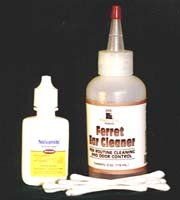-
- Note:
- These articles and images are copyrighted and may not be reprinted, re-used, reposted, copied, or otherwise distributed without permission from the author.
Disclaimer:
You should not rely on the veterinary advice or information provided on this site for diagnosis or treatment of any specific situation. Always consult your own veterinarian for specific advice concerning the medical condition or treatment of your own pet or animal.

|
Yes, You Have to Clean Your Ferret's Ears
© Erika Matulich, Ph.D.
Ferrets rely on their hearing more than on their eyesight. They also produce lots of earwax, which can affect their hearing. That's why it's important for you to regularly inspect and clean those ears. Every other week is a good regimen, though this does depend on the ferret. (Slinky and Bear get their ears cleaned each week, while Misty and Stevie are OK with the once-a-month treatment.) If you don't clean out earwax regularly, a strong odor results, and your ferret can experience temporary hearing loss and discomfort from pressure and infections. Worse yet, earwax is an excellent breeding ground for ear mites.
Because different ferrets have different amounts and colors of earwax, it's hard to say exactly what's normal. The earwax is usually light brown, orange, or reddish. Slinky has chronically dirty ears with dark-brown residue, and Stevie has just a little tan-colored earwax. Also, the same ferret can produce varying amounts of earwax at different times of the year (they produce more during the summer and during seasonal changes).
Most ferrets hate having their ears cleaned, so the first few cleanings may be challenging. Some ferrets get used to it and simply sigh and accept their fate. Others, like my Bear, will struggle forever. If your ferret is like Bear, you may need help from another person to keep her still. With practice, however, you should be able to scruff the ferret with one hand and clean the ear with the other. It might help to distract your ferret with treats such as Ferretone (some of my ferrets prefer Linatone for dogs).
How to clean a ferret's ear
Use soft cotton swabs to clean your ferret's ears. Don't use a dry swab; it will irritate the sensitive skin inside the ear. Use an ear-cleaning solution or a miticide that is labeled safe for use in kittens or rabbits (preparations labeled safe for adult cats or dogs or for puppies may be too harsh). Don't use any preparations intended to dry out the ear, and don't use rubbing alcohol, which can destroy ear tissue. Mineral oil, a common home remedy for other pets, will only add to the oily buildup in the ferret's ear, so I don't recommend it. Hydrogen peroxide can be used occasionally but it tends to dry the ear out. In a moment of emergency, you can dampen the cotton swab with plain tap water. I also recommend cleaning your ferret's ears during or after her bath to make sure you remove any soap residue.
Moisten the cotton swab with the ear-cleaning solution and gently wipe it through the crevices of the outer ear. Ferret ears have lots of folds and pockets in their outer ear, and it may take several swabs to remove all the debris collected in these crevices. On average, I use three or four swabs per ferret. Only clean the part of the ear you can see! Don't push the cotton swab into the ear canal, even if you see earwax in the canal. If the cotton swab gets too wet and leaves cleaning solution in the ear, gently dab off the excess with a dry swab.
Give your ferret a hug when you are through. She will quickly forgive you for the ear cleaning and be back to her happy, healthy, playful state!
|